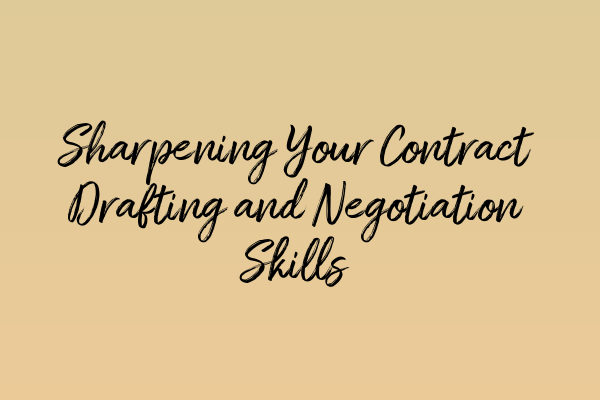Sharpening Your Contract Drafting and Negotiation Skills
Contracts are the backbone of any legal transaction or agreement. Whether you are drafting a contract or negotiating its terms, having strong contract drafting and negotiation skills is crucial. It ensures that all parties involved fully understand their rights and obligations, while also minimizing the potential for disputes and legal issues down the line. In this article, we will explore some essential tips and techniques to help you sharpen your contract drafting and negotiation skills.
1. Understand the Parties Involved
Before you start drafting or negotiating a contract, it is essential to have a clear understanding of the parties involved. This includes identifying the individuals or organizations and their respective roles and responsibilities. Understanding the background and context of each party will enable you to tailor the contract to their specific needs and objectives.
For example, if you are drafting a contract for a technology company entering into a partnership with a software provider, you will need to consider the unique aspects of their industry and the potential risks and benefits associated with their collaboration. This understanding will inform the language and clauses you include in the contract, ensuring it adequately addresses the parties’ concerns.
2. Define the Scope and Objectives
Clearly defining the scope and objectives of the contract is vital to avoid ambiguity and misunderstandings. Outline the purpose and desired outcomes of the agreement, emphasizing the key deliverables, milestones, and performance expectations. This will provide a solid foundation for the different clauses and provisions you will include in the contract.
When negotiating the contract, make sure all parties agree on the scope and objectives. It is crucial to have open and effective communication throughout the negotiation process, ensuring everyone is on the same page. Any discrepancies or disagreements should be resolved before finalizing the contract.
3. Incorporate Clear and Precise Language
One of the most critical aspects of contract drafting is using clear and precise language. Legal jargon can confuse and mislead parties involved, opening doors for potential disputes and litigation. Instead, strive for simplicity and clarity in your contract language.
Break down complex concepts into easily understandable terms and avoid unnecessary technicalities. Use plain language that is accessible to all parties involved, ensuring everyone can fully comprehend their rights and obligations under the contract.
To further enhance clarity, consider using headings, subheadings, and bullet points to structure the contract. This will make it easier for readers to navigate and locate specific information within the document.
4. Anticipate and Address Potential Issues
While drafting a contract, it is essential to anticipate and address potential issues that may arise during the agreement’s lifespan. Consider potential risks, uncertainties, and scenarios that could impact the contract’s performance and the parties involved.
For example, you may include clauses that address termination, breach of contract, force majeure events, and dispute resolution mechanisms. By proactively addressing these issues, you minimize the chances of costly disputes and ensure a smoother contractual relationship.
During the negotiation process, discuss these potential issues with the other party and agree on how they will be handled. This will demonstrate your proactive approach and commitment to creating a fair and balanced agreement.
5. Seek Legal Advice
Effective contract drafting and negotiation require a thorough understanding of legal principles and best practices. If you are unfamiliar with contract law or need assistance with complex legal concepts, it is wise to seek legal advice.
A qualified solicitor can provide valuable insights, review your contract draft, and ensure compliance with applicable legal requirements. They can also offer guidance during the negotiation process, helping you navigate potential pitfalls and secure the best possible outcome.
If you are preparing for a career in criminal law, check out our related article on SQE Prep: Tips and Tricks to Excel in Criminal Law. It provides useful tips to help you excel in your journey towards becoming a criminal law expert.
In conclusion, sharpening your contract drafting and negotiation skills is essential for any legal professional. By understanding the parties involved, defining the scope and objectives, using clear language, addressing potential issues, and seeking legal advice when necessary, you can ensure that your contracts are well-drafted, properly negotiated, and ultimately protect your clients’ interests.
For more legal insights and information, check out our other articles:


Leave a Reply